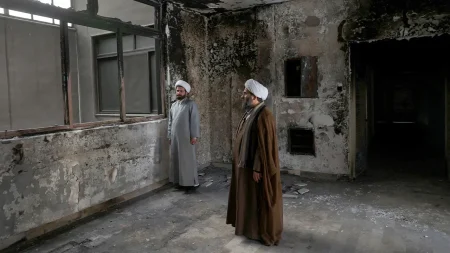Hungary Moves to Follow US in Classifying Antifa as Terrorist Organization Amid Strengthening Relations
In a significant development reflecting the evolving diplomatic landscape between Hungary and the United States, Hungarian officials are poised to follow the Trump administration’s lead in designating Antifa as a terrorist organization. Speaking to Fox News Digital at the United Nations this week, Hungarian Foreign Minister Péter Szijjártó articulated that this move underscores the growing alignment between the two nations in the post-Biden era. “This is another issue which shows that the current Trump administration and the government of Prime Minister Orbán are close to each other when it comes to major political issues,” Szijjártó explained. The Hungarian government views Antifa as an extremist organization that encourages violence against innocent people—a perspective they now share openly with the Trump administration. The decision follows Prime Minister Viktor Orbán’s recent radio statement that it was time for Budapest to adopt “the American model” in addressing this issue, highlighting a deepening ideological synchronicity between the two administrations.
The Hungarian government’s stance on Antifa stems partially from a 2023 incident where activists allegedly assaulted individuals they believed were associated with a far-right event in Budapest. Among those implicated was Italian Antifascist activist Ilaria Salis, who has since become a member of the European Parliament—granting her immunity from prosecution. Szijjártó expressed frustration over this outcome, characterizing it as a “shame” that Hungary could not pursue legal action against her. His criticism extended to the European Parliament itself, which he described as an “over-ideologized and over-politicized body ruled by the extremist, liberal, very aggressive extremist liberal mainstream.” While Hungary has urged the European Union to likewise classify Antifa as a terrorist organization, Szijjártó admitted having “less hope” that the EU would follow suit, revealing the tensions that exist between Hungary’s nationalist government and the broader European political establishment.
The relationship between Hungary and the United States has undergone a remarkable transformation following the transition from the Biden to the Trump administration. Szijjártó did not mince words when describing this shift, stating that “under the Democrat administration, we Hungarians were considered as enemies. There was a very hostile approach by the Democrat administration.” In contrast, he characterized the current relationship as experiencing a “golden age,” noting that things have “totally, totally changed” since President Trump took office. This dramatic improvement in bilateral relations highlights how the ideological alignment between the nationalist-conservative governments of Hungary and the United States has facilitated a more harmonious diplomatic partnership, replacing what Hungarian officials perceived as antagonism from the previous administration with newfound cooperation and mutual respect.
On matters of international security, Hungary has expressed support for Trump’s call for increased NATO spending, particularly as the alliance confronts challenges such as recent airspace incursions in Denmark, Estonia, and Poland—some reportedly connected to Russia. Szijjártó emphasized to Fox News Digital that Hungary views NATO as “a very important pillar of European security” and hopes to see the alliance strengthen further in the coming years. “We have agreed with the approach of President Trump arguing in favor of increasing the share of defense spending of the allies’ GDPs,” he stated. This alignment on NATO funding demonstrates another area where Hungary and the Trump administration find common ground, even as debates about the alliance’s future and funding mechanisms continue to evolve across Europe and North America.
Hungary’s geographic proximity to Ukraine places it in a unique position to understand the risks associated with the ongoing conflict between Russia and Ukraine. Sharing a border with the war-torn nation, Hungary has witnessed firsthand the devastating impacts of the war. In his interview, Szijjártó offered a sobering assessment of the potential consequences should tensions between NATO and Russia escalate further, warning that such a confrontation could trigger a third world war. Despite these concerns, the Hungarian government sees President Trump as a potential peacemaker in the region, with Szijjártó explicitly stating that “President Trump is the only hope to make peace.” This perspective reflects Hungary’s belief that diplomatic engagement, rather than military confrontation, offers the best path forward for resolving the conflict and preventing further escalation.
The Hungarian foreign minister emphasized the critical importance of continued dialogue between the United States and Russia, arguing that global security depends on maintaining open channels of communication between these major powers. “Whenever there is a civilized, high-level Russia-U.S. engagement, then the security situation of the world is improving. Whenever there is lack of U.S.-Russia talks, then the global security situation deteriorates,” Szijjártó observed. This view aligns with Hungary’s preference for diplomatic solutions over military confrontation and explains the government’s optimism about the Trump administration’s potential to broker peace in Ukraine. As Hungary continues to strengthen its ties with the United States under President Trump, this shared perspective on Russia, NATO, and international security appears to be cementing a relationship that Hungarian officials describe as having entered a new golden age—a striking contrast to the tensions that characterized U.S.-Hungary relations during the Biden presidency.














